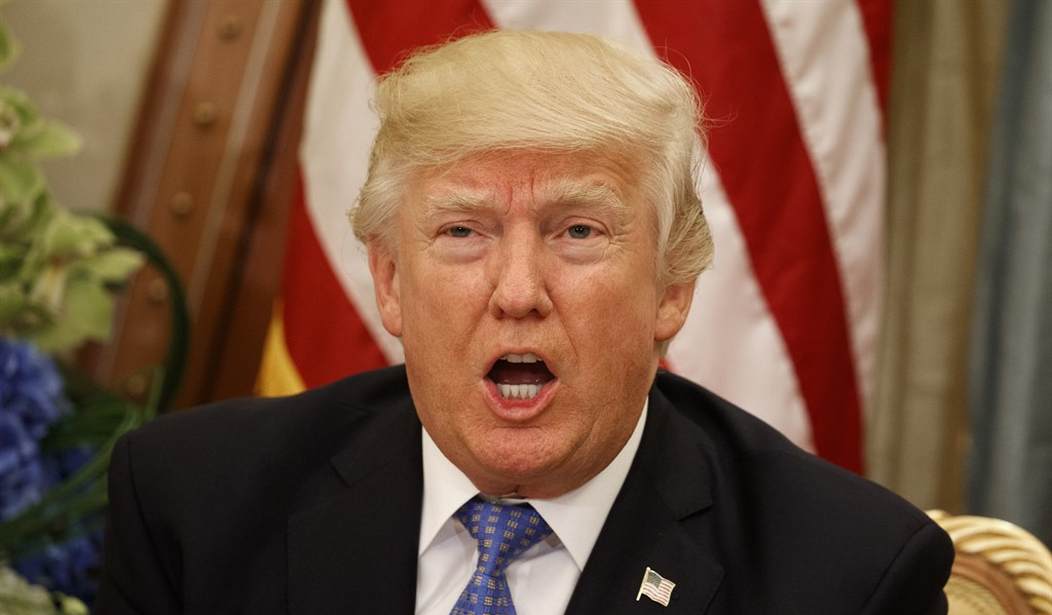Just when everyone here was deep in preoccupation with partisan fantasy over whether President Donald Trump should be impeached or removed by the 25th Amendment, he changed the subject. Presidents can do that.
He flew to Saudi Arabia to introduce himself to the assembled leaders of the region -- more than 50 of them -- as "a representative of the American people, to deliver a message of friendship and hope."
Boilerplate diplomatic language or not, and even if interrupted by the continued din of media snarling and sniping back home, it was a refreshing change. The Trump scandals, real or mostly imagined, aren't going to go away no matter where the president goes, but the events in Riyadh were a promising focus on foreign policy that needed attention and repair after President Barack Obama's destructive leadership from behind.
The president used many religious references in addressing the assembled Sunni leaders, but he avoided the phrase "radical Islamic terrorism" that soft-liners in the White House, directed by national security adviser H.R. McMaster, prefer. McMaster can be pleased that the president's rhetoric has "evolved" and perhaps now understands that the Islamic State group is only pushing a "perverse" interpretation of Islam.
But the president didn't succumb to the mealy rhetoric of Obama. There was no trace in Riyadh for an apology for American arrogance or invoking language to undercut the importance of American leadership in the world. Trump did not mince words; he told the assembled leaders, "Muslim nations must be willing to take on the burden if we are going to defeat terrorism and send its wicked ideology into oblivion." He described the frequent innocent blood in the streets as the struggle between "barbaric criminals who seek to obliterate human life and decent people of all religions who seek to protect it." This is "a battle between good and evil," he said. And that was before the latest massacre, this time in Manchester, England.
Recommended
Trump said he wants young Muslim boys and girls, like boys and girls everywhere, to grow up "free from fear, safe from violence, and innocent of hatred" just one day before the British-born suicide bomber of Libyan descent, known for chanting Islamic prayers loudly in the street, was making last-minute adjustments to his bomb devised to kill young boys and girls innocently attending a concert of their favorite pop star, Ariana Grande.
Words can't capture the perversity that drives such evil, but everyone knows the source; such evil is encouraged and abetted by IS, both in radical mosques and on social media. The pageantry and symbolism of diplomatic visits like Trump's in Saudi Arabia can easily appear to be mere window dressing, mocking the deeply held and universal desire of decent folk everywhere to live in peace. But presidential rhetoric can make a difference.
During the first days of Soviet leader Mikhail Gorbachev's revolutionary (for Russia) doctrines of perestroika ("restructuring") and glasnost ("openness") in the 1980s, I visited the Soviet Union and met Russians behind the Iron Curtain, many of them journalists, who were beginning to feel the first faint breezes of freedom and entertaining the first realistic dreams of escaping Soviet tyranny. They described how inspired they were when they first heard Presdient Ronald Reagan call the Soviet Union an "evil empire." The Gipper got a hard time from critics at home; they said his message was harsh, undiplomatic and unhelpful Cold War rhetoric. But these Russians, who knew how evil the empire was, heard a powerful voice speaking for them.
President Trump's exhortation to Muslims to drive extremists out of their places of worship, their communities, their holy land and this earth was a similar summons to hope. Forging bonds of friendship, security, culture and commerce require carrots along with sticks, of course -- in this case billions of dollars for the Saudis to advance safety and security in the defense against terrorism, which s crucial to checking the hostile ambitions of Iran. Such deals are expensive, but they focus both mind and body.
The Saudis have spent much of their oil wealth in support of mosques, schools and cultural centers across the Muslim world, and even among us -- hotbeds of anti-Western, anti-secular values and hatred of Christians and Jews. It was no coincidence that nearly all of the villains of 9/11 were Saudis. It's no good denying that for the sake of good feelings wrought by Trump's travels. The investment in friendship, modern arms and technology can pay dividends if the Saudis change their message and actually work to defeat terrorism. That's a very big "if," but it may be a risk worth taking if Muslims of good will get the president's message loud and clear -- in dollars and good sense -- and take it to heart.
























Join the conversation as a VIP Member